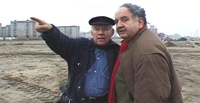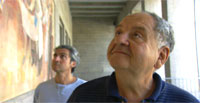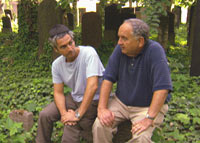404 Not Found | ||||
 | |
 | |
 | |
|
caption: In "A Jew Among the Germans," airing Tuesday, May 31, at 9 P.M. on PBS (check local listings), filmmaker—and Holocaust survivor—Marian Marzynski sets out on a personal quest to find out how Germans are going to design a memorial to the six million Jews murdered during the Holocaust. Meeting with artists, architects and planners who struggle with questions of guilt, responsibility, and memory, Marzynski tries to reconcile his own relationship to the German people. top photo: Filmmaker Marian Marzynski visits memorial site with Israeli sculptor Dani Karavan. middle and bottom photos: Filmmaker Marian Marzynski reflects with German friend Dr. Thomas Mehrel. Image may only be used in editorial conjunction with the direct promotion of this film in North America. No other rights are granted. All rights reserved. © WGBH | |
» A Jew Among the Germans
Tuesday, May 31, at 9pm, 60 minutes
As a young Jewish boy trying to survive the Holocaust in Poland, Marian Marzynski felt nothing but terror at the sound of the German language. Once, riding on a trolley outside the Warsaw Ghetto, a Nazi officer sat five-year-old Marian on his lap and called him a "nice boy." "I was choked with fear," Marzynski later recalled. For years, he lived with this fear of the people who had invaded his country and killed much of his family.
When the German government announced that it was planning to build a "Memorial to the Murdered Jews of Europe" to mark the sixtieth anniversary of the end of World War II in May 2005, Marzynski decided it was finally time to go to Berlin himself. "Today, I would like to achieve what my lost relatives could not," Marzynski says. "To feel safe among the Germans."
In "A Jew Among the Germans," airing Tuesday, May 31, at 9 P.M on PBS (check local listings), FRONTLINE presents Marzynski's moving and provocative search for a Germany that he—and his children—can live with. Over several years of filming, Marzynski encounters artists, architects, and everyday Germans, who wrestle with the big questions of guilt, responsibility, and memory. He also meets a young, "third generation" of Germans who have broken with their parents and grandparents over the war. Rejecting collective guilt, these young Germans are looking for a way to keep the Holocaust in living memory. Gesine Weinmiller, a young architect participating in the memorial competition, tells Marzynski, "The problem for us is that we have no more Jews here in Germany...I think people who [are] my age, they don't meet any Jews. And so they, they have no problem with the Holocaust because it doesn't exist in their life."
In Berlin, Marzynski meets Dani Karavan, an Israeli sculptor whose plan for the German memorial is a giant Star of David with flowers. When Karavan begins to draw it in the dirt on the site, a security guard stops him and demands Marzynski's filming be stopped, saying the site is off-limits without special permission. Karavan tells Marzynski that the memorial will never be built because the Germans don't want it. "They will not let it to be built. Because they don't want it to be built. There will be another discussion, another competition. There will always...be somebody who will be against it."
One of the jurors of the memorial competition, Dieter Ronte, an art museum director from Bonn, tells Marzynski that his father was a Nazi. "Is that true that in German family you cannot ask father, daddy how many people you killed?" Marzynski asks. "No," the man responds. "You cannot: There will be no answer."
At Berlin's new Jewish Museum, Marzynski finds Johannes Schwartz, a young gentile who teaches Germans about Jewish religion and customs. Marzynski thinks the museum's program is well intentioned, but even Schwartz concedes that it's hard to change minds. "Any anti-Semite coming here won't be changed in a museum like this," Schwartz says. "That's what we are told in our training, that you won't change anybody in here. We can just offer some knowledge."
Peter Eisenman, the American architect who ultimately wins the competition to design Germany's Holocaust memorial, tells Marzynski of his plan to erect several thousand concrete slabs in towering, tilting lines on the memorial site. "We wanted to get over this idea of the Jew as 'other'....And it's to bring the Jewish cemetery into the everyday experience of the German, in the middle of the city." But Marzynski fears that Eisenman's design reinforces a bad message: that the only Jews who can safely dwell among the Germans are dead ones. He favors a German artist's plan to ask the question "Why?" in the thirty-one languages spoken by the victims, and then to record the public's answers in a process of reflection that would never end.
This May, the German Holocaust memorial will be unveiled in Berlin, and Marzynski feels ambivalent about it. "I wish there would be no celebration of the end of World War II, no finishing touches... I understand young Germans discomfort with guilt. But without an emotional quest, how will the memory of German evil be preserved? Could there be such a thing as good guilt?"
"A Jew Among the Germans" is a Marz Associates film for WGBH/FRONTLINE. The producer, writer, and director is Marian Marzynski, who also serves as the film's correspondent.
FRONTLINE is produced by WGBH Boston and is broadcast nationwide on PBS.
Funding for FRONTLINE is provided by The Park Foundation and through the support of PBS viewers.
FRONTLINE is closed-captioned for deaf and hard-of-hearing viewers.
FRONTLINE is a registered trademark of WGBH Educational Foundation.
The executive producer for FRONTLINE is David Fanning.
Press contact:
Chris Kelly
frontline_promotion@wgbh.org
(617) 300-3500
FRONTLINE XXIII/May 2005
home » previous reports » watch online » about us » teacher center » newsletter » email FRONTLINE
privacy policy » wgbh » pbsi
new content copyright ©1996-2005 pbs online and wgbh/frontline